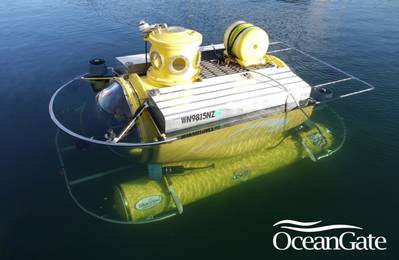Manned Submersible to Hunt Invasive Florida Lionfish
OceanGate Inc. to host a 3-day event to promote awareness and gauge impact of Lionfish on ocean habitat and economy.
The global provider of deep-sea manned submersible solutions, OceanGate, is helping to raise awareness of the widespread invasion of lionfish, a non-native predator known for its venomous spines and increased numbers in the waters of Florida, the Caribbean and the Gulf of Mexico. From June 27 to 29, 2013, the five-person manned submersible Antipodes will take scientists on a series of dives off the Florida coast to study the growing lionfish population. The goal of the three days of diving and panel discussions is to foster long-term collaboration among scientists to halt the unprecedented expansion of this invasive species.
Native to the South Pacific and Indian Oceans, lionfish have been increasingly affecting fisheries and tourism since they were introduced to the Atlantic Basin sometime in the early 1990s. Due to fast reproductive rates and lack of any natural predators, lionfish are able to reach a population density of 200 per acre and reduce native fish populations by up to 80 percent. This threat extends from the marine environment to the economy as recreational saltwater fishing on Florida's east coast "generated 29,000 jobs and $3.3 billion in sales" in 2011 alone, according to NOAA.
"Our expedition is an opportunity for some of the most respected marine experts in the region to come together and find a way to further science on the lionfish epidemic," states Stockton Rush, OceanGate founder and CEO. "Lionfish are a serious threat to the ecosystems of the Atlantic, Gulf of Mexico and Caribbean waters, and we're pleased to provide our manned submersible for this research initiative and for the collaboration between organizations such as Nova Southeastern University (NSU) and the Florida Fish and Wildlife Conservation Commission, all of which share an interest in raising awareness and exploring methodologies for lionfish population controls."
OceanGate first raised national awareness of the lionfish threat in 2012, during the discovery of a downed World War II Hellcat fighter aircraft. Footage of the wreck showed a dramatic number of lionfish and caught the attention of marine biologists.
The expedition will be hosted at Nova Southeastern University's Oceanographic Center in Hollywood, Florida, and will conclude at the state-of-the-art facility on Saturday, June 29, with a panel of leading experts on aquatic invasive species. Scientists will discuss the data, their first-hand observations, and imagery captured during the expedition. Following the summit, Chef Kareem Anguin from The Oceanaire Seafood Room in Miami will showcase some of the easiest and tastiest ways to cook lionfish to help promote commercial fishing of the species -- one of the possible solutions to control the population.
"The opportunity to further current research with submersible dives beyond diver depths will offer much needed insight into the species, and bring science closer to a solution for control," states Richard E. Dodge, Ph.D., Dean of NSU's Oceanographic Center.
http://www.oceangate.com/expeditions/invasive-lionfish-expedition.html















